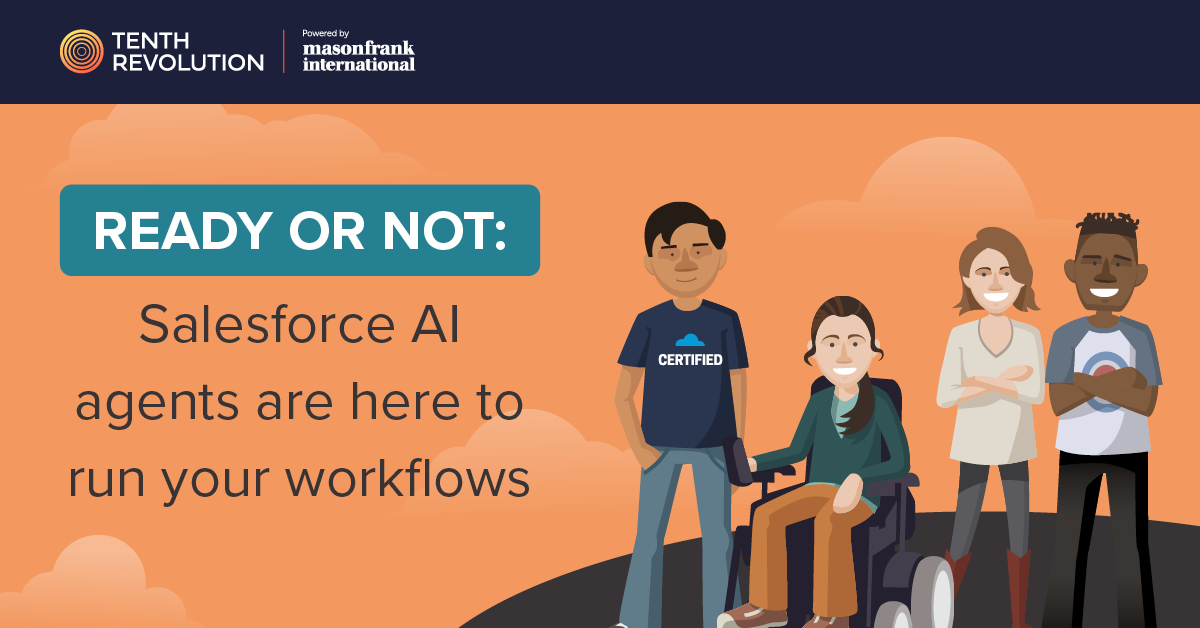
AI in Salesforce has entered a new phase.
What began with simple copilots that helped users write emails or summarize service cases has evolved into a new approach known as agentic AI. This refers to autonomous systems that can complete full workflows without human input, handling tasks from start to finish inside Salesforce.
With Einstein Copilot and Agentforce now part of the Einstein 1 Platform, Salesforce users are seeing AI move from guidance to full operational support. These AI agents reduce repetitive work, improve compliance, and allow teams to focus on the higher-value goals that drive growth.
What agentic AI means for teams
Agentic AI describes intelligent software that takes actions independently based on context and data, not just suggestions. It uses information already stored within Salesforce to perform tasks automatically.
Early AI features in Salesforce supported human decision-making. Agents now perform those actions themselves. For example:
- A service agent can resolve a customer issue, update the case record, and send a confirmation email.
- A sales agent can generate a proposal, route it for approval, and prepare a renewal quote.
- A marketing agent can launch a campaign automatically when a lead reaches a certain stage.
This evolution makes AI an active part of the workforce. For executives, it means having teams who know how to manage automation, monitor AI behavior, and ensure the technology supports business goals.
Mason Frank International helps organizations hire Salesforce professionals who can build, configure, and manage these new intelligent workflows in secure and effective ways.
Why data and governance come first
Allowing AI to act inside your CRM requires strong control over data and systems. Without that foundation, automation can outpace oversight and create unnecessary risk. Salesforce mitigates this through the Einstein Trust Layer and Salesforce Data Cloud, which give enterprises the structure and visibility needed to scale safely.
- Grounded data: Agents work from unified customer profiles in Salesforce Data Cloud, ensuring decisions are based on accurate, up-to-date information.
- Compliance controls: Privacy preferences and consent settings are built directly into the data model.
- Audit tracking: Every AI action is recorded, providing full visibility for leadership.
- Security protection: Sensitive data remains within Salesforce’s secure environment.
These features ensure that agentic AI operates with accuracy, transparency, and reliability across departments.
How enterprises are already using AI agents
Across industries, Salesforce users are applying agentic AI to make work faster and more consistent.
In customer service, telecom companies are using AI agents to manage thousands of support tickets automatically. Routine issues are resolved instantly, leaving human staff to focus on complex or high-value cases. In sales, subscription-based companies use agents to process renewals and update billing records, helping teams close cycles faster. In marketing, real-time triggers allow automated follow-ups when a customer engages with a campaign or abandons a cart.
Each of these examples shows automation working alongside people. Teams spend less time on repetitive tasks and more time strengthening relationships, solving problems, and planning for growth.
Preparing for the shift to intelligent automation
Agentic AI introduces opportunities as well as responsibilities. Leaders should prepare both their technology and their workforce for the changes ahead.
Focus areas include:
- Cultural readiness: Employees will need to move from manual execution to managing automated processes.
- Governance frameworks: Compliance, legal, and IT teams should agree on clear rules for AI usage and accountability.
- Data readiness: Reliable automation depends on clean, real-time data within Salesforce Data Cloud.
- Talent development: Teams need professionals who understand how to design, monitor, and refine agentic workflows.
Mason Frank International works with businesses to find Salesforce specialists who can align automation with company values, ensuring AI supports people rather than replacing them.
Building the workforce behind agentic AI
Agentic AI delivers results only when guided by people who understand both technology and strategy. Skilled Salesforce professionals can connect automation capabilities to business goals, helping leaders manage AI responsibly and effectively.
Key roles now in demand include:
- Salesforce AI solution architects who integrate agentic tools into enterprise workflows.
- Data and governance specialists who maintain accuracy and compliance.
- Automation developers who build scalable, repeatable AI processes.
- Change managers who help teams adopt new ways of working confidently.
Organizations that invest in these professionals early will find it easier to maintain control as automation scales across departments.


